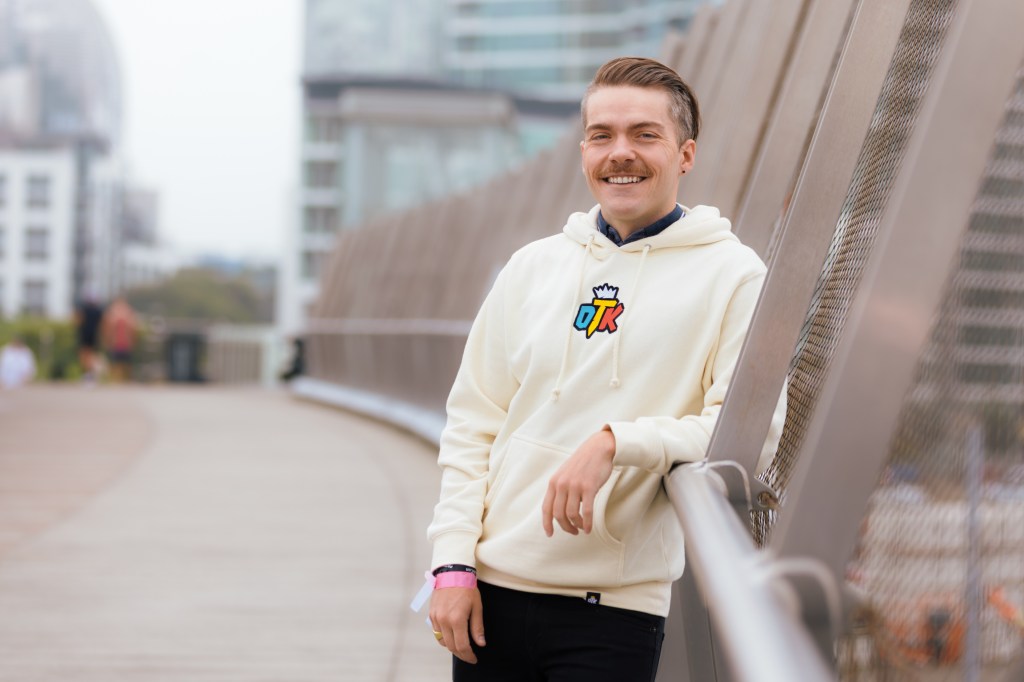Secure your place at the Digiday Media Buying Summit in Nashville, March 2-4
How gaming organization OTK strikes a balance between creator-ownership and more traditional executive experience

The boardroom power wielded by esports organizations’ creator–executives has come under increasing scrutiny over the past year — but many of these organizations would never have attained their sky-high valuations if not for the hype generated by their creator–owners. Gaming organization One True King is looking to thread the needle between these two poles by balancing its creator leadership with a suite of executives that cut their teeth in more traditional roles.
Since its formation in October 2020, creator ownership has been a core part of One True King’s DNA. The group is constantly adding new talent to its list of creator–owners, fueling a rapid rise and accolades such as “Best Content Organization” at last year’s Streamer Awards. The organization signed a brand partnership with Razer in June 2022 and boasts a total social media following of 1.7 million, according to the data platform GEEIQ.
To learn more about One True King’s mix of creator–leadership and more traditional business experience, Digiday reached out to OTK Chief Strategy Officer Zachary Diaz, vp of sales and partnerships Willis Wiggin and COO and creator–owner Tips Out for an annotated Q&A.
This conversation has been edited and condensed for length and clarity.
On describing OTK as a ‘gaming organization‘ instead of an esports organization

Tips Out:
The biggest reason why is, fundamentally, that we don’t field any competitive teams. If we were to describe ourselves most accurately, it would be that we’re a media company. Our job is to put on the best content we possibly can for our gaming-endemic and gaming-adjacent audiences. We are not an esports team, in the same way that Warner Brothers or Universal or NBC or any of these media companies aren’t sports teams.
In our space, it’s a little strange, because a lot of the original organizations were “esports orgs.” So there’s definitely a lot of conflating, especially when you’re talking to people that aren’t quite as dialed in. Ultimately, we don’t field any esports teams and we don’t really have plans to go down that avenue in the near future.

Digiday:
OTK did field a “World of Warcraft” team back in the day, but the org hasn’t been in the business of competitive gaming since 2021. Tips didn’t say it outright, but OTK’s decision to avoid esports reflects more general doubts surrounding the role of competitive gaming in the industry. Investors have lost confidence in the revenue-generating abilities of pure esports companies, pushing esports orgs to increasingly branch out into content creation and other alternative revenue streams.
To some extent, the term “gaming organization” is a more apt descriptor for today’s leading esports orgs. But it’s also just advantageous branding for OTK. Esports has always been a bit of a growth on the side of the gaming industry, and OTK has decided to latch onto the host, rather than the tumor.
On the importance of creator buy-in for OTK’s brand partnership strategy

Willis Wiggin:
The beautiful thing about joining OTK as a talent, or owning OTK, is that each of the shows are typically anchored by a talent. Some people have deep-rooted interests in sports, or some in cosplay. And so if we develop an IP around them, and surround them with a show that they want to make, then they’re super motivated to get it paid for.
And how do we pay for the production? Well, it’s going to be brand partnerships. So what brands can we work with that make the most sense for a sports show, and how do we want to integrate it into the show in a very creative, fun way? We’ve seen a lot of success with that with our talent.

Digiday:
OTK’s brand partnership strategy requires all of the org’s creator–owners to sign off on potential sponsors. The company holds weekly or biweekly all-hands meetings, in which owners can discuss prospective deals, as well as livestreamed quarterly shareholder meetings.
This practice has obvious limits — there are only so many brands that will satisfy every owner — but it keeps OTK honest, too. The org’s creators are more likely to participate in branded content if they feel they have a voice in the process.
On the potential risks of going too corporate

Willis Wiggin:
If you look at people like FaZe Rain and FaZe Teeqo — I don’t know if you’ve seen their cries out to the community right now about FaZe becoming too polarized, in regards to these corporate folks taking too much control and the community losing what FaZe Clan was. At OTK, we have the advantage of starting way later in this industry, so we were able to kind of take notes and lessons from extremes that have happened in the past.
I was at FaZe; I can’t speak on the record about a lot of what happened, but FaZe Rain and FaZe Teeqo were there for 12 years, and they were founders of FaZe Clan. If you give up too much control to the public, or too much control to VCs, you might be at risk of losing your identity — and that’s what your fans, your viewers, ultimately care about. The people who purchase products, the people consume your content.

Digiday:
Wiggin worked at FaZe Clan between February 2018 and May 2022, including stints as a director of sales operations and head of brand partnerships.
FaZe Clan’s decision to undergo a $725 million SPAC merger in July 2022 is now widely considered to be a blunder by industry observers. In January, the company flirted with a possible Nasdaq delisting in January as its share price fell below $1.
Investors’ lack of confidence in FaZe has been at least partially driven from inside. FaZe’s aforementioned creator–founders have vocally spoken out against the current management of the company, claiming a lack of control over the org’s current direction. The FaZe situation shows how organizations that decouple themselves entirely from their creator–owners risk turning those creators — and their fans — from assets into enemies.
On the role of creator–ownership in keeping talent engaged

Zachary Diaz:
I have seen that light bulb switch in so many of these creators — it’s like, you could have very easily made a different decision, and it still would have been appropriate for you as an individual. But as a steward of this community, of this organization, you’re trying to think of whether this is sustainable two years from now.
The creators recognize they are building long-term value, because you have creators joining the ownership. As they start to work with Willis and build an IP around them, or as they launch shows, they get really involved. It’s really that we want them to carry this as part of their legacy, because we are seeing what could happen in this creator economy.

Digiday:
OTK is not the first gaming or esports organization to offer equity to its members. Organizations like 100 Thieves and Team Liquid have at times invited a select group of prominent creators on their roster to become company owners. This is a tacit acknowledgment of the fandom-generating power of individual creators in gaming; the orgs know they’ll be screwed if their top creators leave, so they offer them equity to keep them around.
At OTK, this strategy was baked in from the beginning; every creator on the org’s roster automatically gets equity. As shown by Diaz’s observations above, this has made OTK talent care more about the long-term future of the company, rather than viewing it as a way to make a paycheck in the short term.
More in Marketing

Future of Marketing Briefing: AI’s branding problem is why marketers keep it off the label
The reputational downside is clearer than the branding upside, which makes discretion the safer strategy.

While holdcos build ‘death stars of content,’ indie creative agencies take alternative routes
Indie agencies and the holding company sector were once bound together. The Super Bowl and WPP’s latest remodeling plans show they’re heading in different directions.

How Boll & Branch leverages AI for operational and creative tasks
Boll & Branch first and foremost uses AI to manage workflows across teams.








